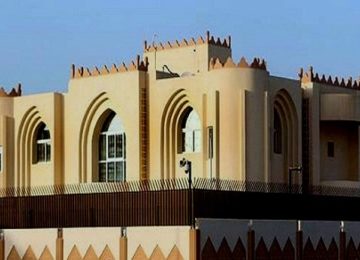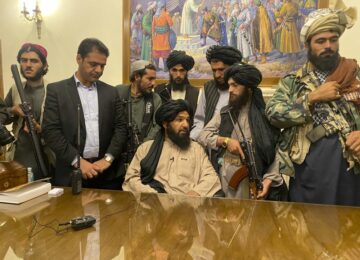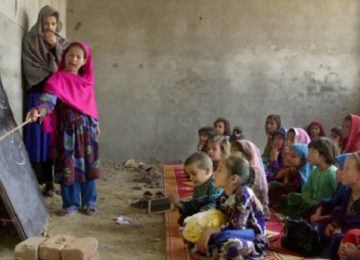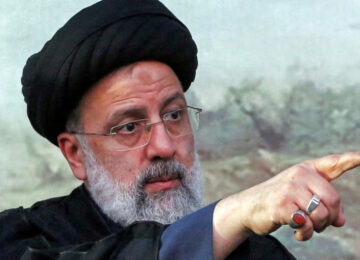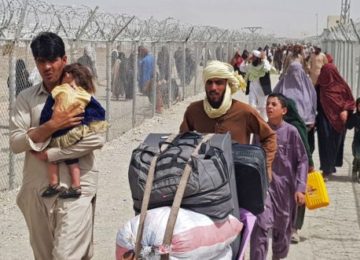In April, Qari Hekmatullah, the self-proclaimed commander of the Islamic State Khorasan Province (ISKP), was killed in a US airstrike. Under his command, a local affiliate of the Afghan-Pakistani Daesh affiliate, ISKP, had challenged both the government and the Taleban and established almost full control over two remote districts of Jawzjan province, Darzab and Qush Tepa. In this update of earlier reports on the situation in the area, AAN’s Obaid Ali takes a look at the latest dynamics there following Hekmat’s death and finds that his group is still in charge.
The killing of Qari Hekmat
On 5 April 2018, a US airstrike killed Qari Hekmat – as he was usually known – an ISKP-affiliated commander in northern Afghanistan. According to a statement released by US military headquarters, Hekmat was killed in Qorogh village of Belcheragh district in neighbouring Faryab province. General Faqir Muhammad Jawzjani, the province’s police chief, also confirmed that he had been killed in a US airstrike (media report here).
Sources close to Hekmat told AAN that he had survived a drone attack a day earlier, on 4 April 2018, while he and two of his bodyguards were en route to visit fighters in the village of Qorogh (where he was killed the following day). The attack that killed him along with one of his bodyguards was carried out as they attempted to return to his base in Sar Dara village in the district of Darzab. The second bodyguard was wounded.
Qorogh is a village on the Faryab side of the border between this province and his stronghold in Jawzjan. But it is surrounded by a number of villages that belong to Darzab district. For this reason, Qorogh’s inhabitants interact mainly with residents from Darzab. Hekmat’s presence there was due to the proximity of the village to his base and was not a sign that he was planning to expand his activities in Faryab.
Qari Hekmat was a former Taleban commander who, in 2015, joined the Islamic State Khorasan Province (ISKP), a recognised branch of the Syria/Iraq-based Islamic State (IS) for Afghanistan and Pakistan, an area the IS calls Khorasan. Under the ISKP banner, Hekmat took over most of Qush Tepa and Darzab districts and established his own parallel administration (read more AAN background on Qari Hekmat here and here).
A new leader
After Qari Hekmat’s killing, the group’s decision-making council appointed Mawlawi Habib Rahman as his successor. Hekmat had established the council, which consists of 14 loyal commanders, although its exact composition is not known. With its military and administrative structures, the council serves as the core management body for the local ISKP branch (more AAN reporting here). It discusses and decides on military, public outreach, finance and security issues every month.
Unlike Hekmat, 31 year-old Mawlawi Habib Rahman is a relative newcomer to the Jawzjan insurgency and not a local. The Uzbek from Sholgara district in Balkh province joined Hekmat’s forces in 2016. Previously he had served as the head of the group’s shadow judiciary and as a member of the decision-making council (read AAN’s previous analysis here). He had thus demonstrated his capacity to serve in a relatively high position within the group under Hekmat’s command. Despite his young age, limited local knowledge and military experience, his appointment seems to have happened without dispute and largely due to the fact that he is a religious scholar and was Hekmat’s close aide in the early stages of the pro-ISKP formation.
Habib Rahman is also the brother in-law of a former Taleban shadow district governor in Qush Tepa, Mufti Nemat, who surrendered to General Abdulrashid Dostum in 2015. He later switched sides again to join the late Hekmat. Mufti Nemat continues to operate in Darzab and might also have supported the appointment of Habib Rahman to lead the group.
The consequences of Qari Hekmat’s death
The killing of Qari Hekmat has not led to a visible weakening of the military position of the group in either of the districts they control. This has been confirmed to AAN by various sources. In the eyes of Sher Muhammad, an Afghan Local Police (ALP) commander in Darzab district, the killing did not have “any negative impact” on the group or its grip over the two districts. He told AAN “The Daesh front line is only 500 metres away from the Afghan security force’s base in Darzab district centre.” The district governor of Qush Tepa, Aminullah Amin, confirmed this to AAN. According to him, Daesh continues to occupy most parts of Qush Tepa and Darzab. While the exact number of ISKP-affiliated fighters in Jawzjan is unclear, Amin further told AAN they were strong enough to defeat the local Afghan security forces. Local sources close to the group told AAN that Mawlawi Habib Rahman currently leads 300 to 400 fighters that include some Central Asians.
Local elders told AAN that the local pro-ISKP group does not have a military base or any other permanent presence in the villages of both districts but that fighters visit villages on a weekly basis, distributing announcements to obey the ISKP’s instructions. But in contrast to this agency report, the ISKP fighters do not dwell “in caves” but occupy houses abandoned by the local population. This is also the case with their headquarters in Sar Dara, a wide valley used for agricultural purposes in Darzab. Despite the lack of a permanent ISKP presence there, neither government forces nor Taleban fighters attempt to enter these villages, for fear that they might be trapped by pro-ISKP fighters.
Following the killing of Qari Hekmat, neither the ANSF nor the local Taleban have attempted to carry out large-scale counteroffensive against pro-ISKP fighters in Darzab or Qush Tepa. The only operation conducted was one by Afghan Special Security Forces (ASSF) and US Special Operation Forces (SOF) in Darzab. According to a statement released by the US-led Resolute Support mission on 11 April – six days after Qari Hekmat’s killing –, the ASSF and SOF killed 22 ISKP fighters in the district. The statement further said that since the beginning of 2018, 90 ISKP fighters had been killed, the majority in Darzab (full text here).
The Resolute Support figure, however, was not confirmed by AAN’s local sources. Speaking to AAN, local elders from Darzab confirmed the 11 April Special Forces operation there but said only “a few” pro-ISKP fighters had been killed and that the US and Afghan forces had left the area again. Local officials also told AAN that there had not been any attempt to carry out a large-scale counter-offensive against ISKP fighters in the province so far. Sher Muhammad, the ALP commander, and district governor Amin, however, insist that such an operation must be carried out in order to eliminate the ISKP threat. Speaking to AAN on 13 May 2018, Najib Danesh, spokesman for the Ministry of Interior, said the Afghan security forces would soon conduct clearance operations against Taleban and ISKP in Jawzjan.
The limited number of local Afghan security forces in Darzab and Qush Tepa hampers such an operation. They are stationed in only a few bases in the district centres and are only capable of protecting the centres as well as a few nearby villages. Deploying reinforcements and logistical supplies to Qush Tepa and Darzab is a serious challenge, as the highway connecting the provincial centre Shebarghan to both districts is mostly controlled and often blocked by Qari Hekmat’s fighters.
Neither have the Taleban yet responded to the pro-ISKP fighters in Jawzjan after their fighters retreated to the neighbouring provinces of Faryab and Sar-e Pul in January 2018 (AAN’s previous report here). This is largely due to the local Taleban commanders’ failure to recruit new local fighters as well as their fear of being targeted by ASSF or US SOF airstrikes. Therefore, the pro-ISKP network in Darzab and Qush Tepa continues to enjoy a monopoly of control in most parts of both districts.
Links with ISKP Central?
It is still not clear how strong the group’s connections are with the ISKP’s main foothold in Afghanistan, in eastern Nangrahar province. In June 2017, a delegation from Darzab visited Nangrahar province (see AAN’s analysis here) but further face-to-face contact has not been reported. In March 2018, a video clip that was apparently filmed by Uzbek fighters operating in Jawzjan under the ISKP flag and released by ISKP supporters on Facebook, featured fighters in Jawzjan pledging an oath of allegiance to the Islamic State. The video also showed a group of young Uzbek boys completing military training and expressing loyalty to the Islamic State, although the exact locations were unclear. Furthermore, it contained material showing an ISKP commander in Nangrahar appealing to IS fighters in Syria and Iraq to join the Afghan ISKP. This was – according to AAN’s knowledge – the first video featuring both ISKP fighters in Jawzjan and Nangrahar provinces.
The pro-ISKP network in Jawzjan does not have its own media wing to release its videos or statements. In most cases, material is distributed through individual Facebook accounts belonging to sympathisers.
Conclusion
Looking at the current dynamics within the ISKP militancy in Darzab and Qush Tepa, its fighters have remained unified and resilient enough to survive the death of their local supreme leader. The late Hekmat’s investment in these isolated and mountainous areas, building on his decade of military experience with the Taleban and his knowledge of the local dynamics, has ensured a strong and resilient pro-ISKP foothold in the southeast of Jawzjan. This is not to say that the killing of Qari Hekmat will not affect the group’s continued military success or its current hold over the two districts over time, particularly as Mawlawi Habib Rahman needs to show whether he can fully replace Hekmat and operate as successfully as he did. But so far there are – despite some losses – no significant signs of disunity or fragmentation within the pro-ISKP fighters in Jawzjan, and their territorial grip remains unchallenged and unchanged.
By Special Arrangement with AAN. Original link.
Disclaimer: Views expressed on this blog are not necessarily endorsed or supported by the Center for Research and Security Studies, Islamabad.




